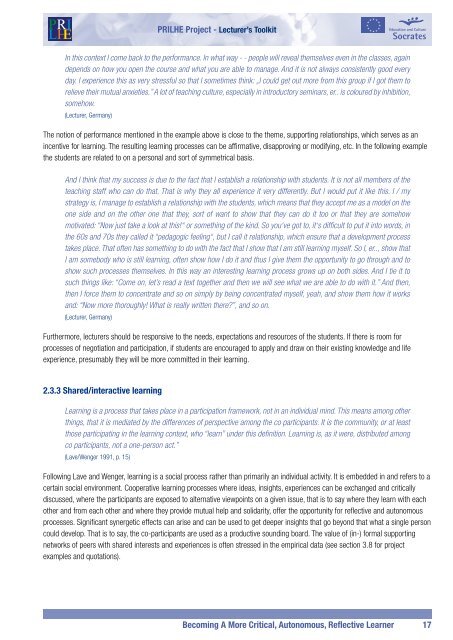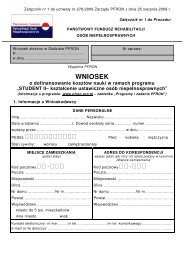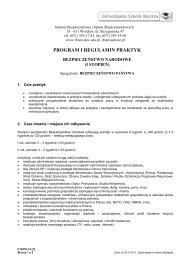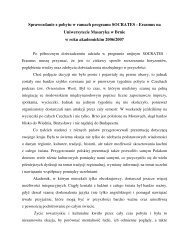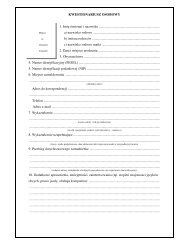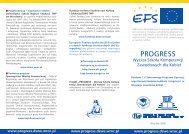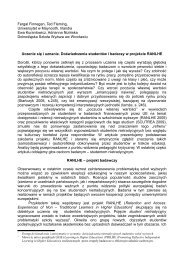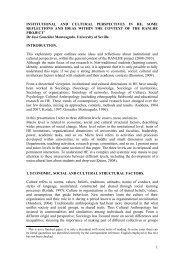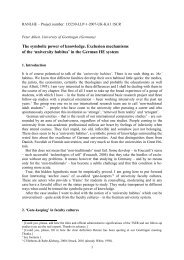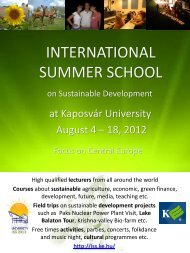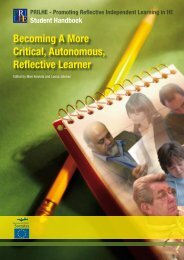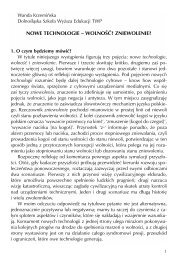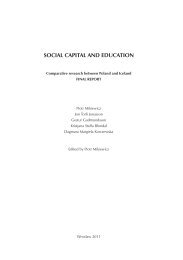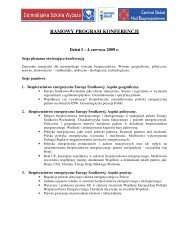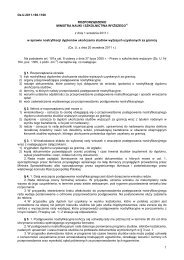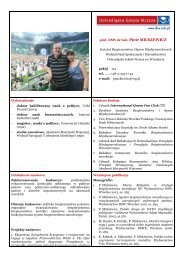Becoming A More Critical, Autonomous, Reflective Learner
Becoming A More Critical, Autonomous, Reflective Learner
Becoming A More Critical, Autonomous, Reflective Learner
You also want an ePaper? Increase the reach of your titles
YUMPU automatically turns print PDFs into web optimized ePapers that Google loves.
PRILHE Project - Lecturer’s Toolkit<br />
In this context I come back to the performance. In what way - - people will reveal themselves even in the classes, again<br />
depends on how you open the course and what you are able to manage. And it is not always consistently good every<br />
day. I experience this as very stressful so that I sometimes think: „I could get out more from this group if I got them to<br />
relieve their mutual anxieties.” A lot of teaching culture, especially in introductory seminars, er.. is coloured by inhibition,<br />
somehow.<br />
(Lecturer, Germany)<br />
The notion of performance mentioned in the example above is close to the theme, supporting relationships, which serves as an<br />
incentive for learning. The resulting learning processes can be affirmative, disapproving or modifying, etc. In the following example<br />
the students are related to on a personal and sort of symmetrical basis.<br />
And I think that my success is due to the fact that I establish a relationship with students. It is not all members of the<br />
teaching staff who can do that. That is why they all experience it very differently. But I would put it like this. I / my<br />
strategy is, I manage to establish a relationship with the students, which means that they accept me as a model on the<br />
one side and on the other one that they, sort of want to show that they can do it too or that they are somehow<br />
motivated: “Now just take a look at this!“ or something of the kind. So you‘ve got to, it‘s difficult to put it into words, in<br />
the 60s and 70s they called it “pedagogic feeling“, but I call it relationship, which ensure that a development process<br />
takes place. That often has something to do with the fact that I show that I am still learning myself. So I, er.., show that<br />
I am somebody who is still learning, often show how I do it and thus I give them the opportunity to go through and to<br />
show such processes themselves. In this way an interesting learning process grows up on both sides. And I tie it to<br />
such things like: “Come on, let’s read a text together and then we will see what we are able to do with it.” And then,<br />
then I force them to concentrate and so on simply by being concentrated myself, yeah, and show them how it works<br />
and: “Now more thoroughly! What is really written there”, and so on.<br />
(Lecturer, Germany)<br />
Furthermore, lecturers should be responsive to the needs, expectations and resources of the students. If there is room for<br />
processes of negotiation and participation, if students are encouraged to apply and draw on their existing knowledge and life<br />
experience, presumably they will be more committed in their learning.<br />
2.3.3 Shared/interactive learning<br />
Learning is a process that takes place in a participation framework, not in an individual mind. This means among other<br />
things, that it is mediated by the differences of perspective among the co participants. It is the community, or at least<br />
those participating in the learning context, who “learn” under this definition. Learning is, as it were, distributed among<br />
co participants, not a one-person act.”<br />
(Lave/Wenger 1991, p. 15)<br />
Following Lave and Wenger, learning is a social process rather than primarily an individual activity. It is embedded in and refers to a<br />
certain social environment. Cooperative learning processes where ideas, insights, experiences can be exchanged and critically<br />
discussed, where the participants are exposed to alternative viewpoints on a given issue, that is to say where they learn with each<br />
other and from each other and where they provide mutual help and solidarity, offer the opportunity for reflective and autonomous<br />
processes. Significant synergetic effects can arise and can be used to get deeper insights that go beyond that what a single person<br />
could develop. That is to say, the co-participants are used as a productive sounding board. The value of (in-) formal supporting<br />
networks of peers with shared interests and experiences is often stressed in the empirical data (see section 3.8 for project<br />
examples and quotations).<br />
<strong>Becoming</strong> A <strong>More</strong> <strong>Critical</strong>, <strong>Autonomous</strong>, <strong>Reflective</strong> <strong>Learner</strong> 17


